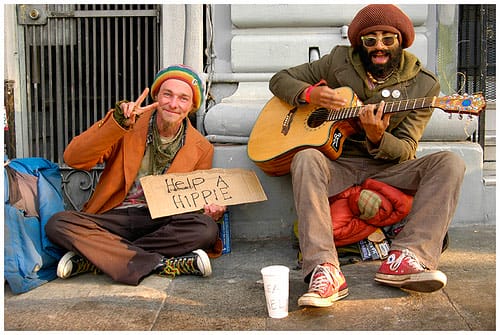Seated on a blanket in Golden Gate Park in San Francisco, Kenny describes how the park has changed during his ten year absence spent growing weed in the California wilderness. “The hippy kids used to be able to sell their weed real easy at high prices,” he tells us. “There were lots of customers and they made enough in a few days to travel for a few weeks. Now though…” At which point Kenny repeats the complaint made by drug dealers throughout the park, that California’s legal dispensaries for “medical marijuana” have depressed prices and stolen away their customer base.
We spoke with Kenny in February as we reported on the street kids of San Francisco, the homeless youths who live and congregate in the Haight-Ashbury neighborhood. The area’s status as a gathering place for young homeless is a legacy of the Summer of Love, the crest of the hippy movement that drew some hundred thousand flower children to smoke, make music, and live communally in Golden Gate Park in 1967.
The street kids are atypical homeless. Many are homeless by choice: Some are the transient underemployed or unemployed that hop railcars across the country. Others represent the remnants of the hippy movement, flitting between San Francisco, weed farms, wilderness, and music festivals. A few are well off kids acting out a Jack Kerouac novel for a few weeks.
We were reminded of the street kids’ stories by some recent reporting from WNYC News on “The Weed Trail.” The segment describes how the legalization of marijuana in California has led more weed dealers to cross the country and sell their stock in New York.
It may seem odd to risk crossing state lines with an illegal substance when it can be grown and sold legally in California. But as the street kids experienced, legalization reduced prices by attracting a glut of new farmers and sellers. Although technically only legal for medicinal purposes, marijuana prescriptions are so easy to acquire that legal dispensaries compete with dealers.
So dealers ship weed in FedEx packages, pay couriers to carry it, or cross the country themselves with product hidden in duffel bags, motor homes, and horse trailers, risking arrest and seizure because risk reduces competition and allows them to profit at higher margins. The movement of weed from California to New York is not new, but it has persisted or even increased since legalization.
While legalization increased the supply of weed in California, the segment suggests that increased transparency – rather than increased supply – explains the price drop. Chuck, a dealer who switched from selling weed in California to New York and quadrupled his income, told WNYC, “There’s plenty of weed in New York. There’s just an illusion of scarcity, which is part of what I’m capitalizing on. Because this is a black market business, there’s insufficient information for customers.”
Since weed is illegal in New York, customers can’t check out different suppliers and compare their prices and products. So even if supply is high, customers still pay a premium as dealers are difficult to find and suppliers are not forced to compete as meaningfully on price or quality.
Stories like this are ammunition for legalization advocates, who point out that legalization drives drug dealers out of business and reduces funding for criminal organizations like Mexico’s drug cartels.
Here in Priceonomics’s home city of San Francisco, however, legalization is also eroding the easy drug profits that have been a lifeline to the remnants of the hippy scene. As Kenny told us in his hippy-centric history of San Francisco’s street kids:
“After the disappointing end of the hippy movement, a number of them switched from trying to change the world to creating small communities that followed their values. They started collectives, weed farms, and music festivals. It’s all part of the scene for these kids.”
For years, these lackadaisical inheritors of the hippy legacy have gotten by on easy weed profits in California. But street kids in the park today have to panhandle and hustle customers. Gangs are dealing in Haight-Ashbury and bringing violence to the park that was once home to the Summer of Love. There are fights and hard drugs and the system of hippie communal living and sharing is being strained by hard times. Forty six years after the end of the Summer of Love, legalized weed is threatening what’s left of its legacy.
This post was written by Alex Mayyasi. Follow him on Twitter here or Google Plus. To get occasional notifications when we write blog posts, sign up for our email list.




